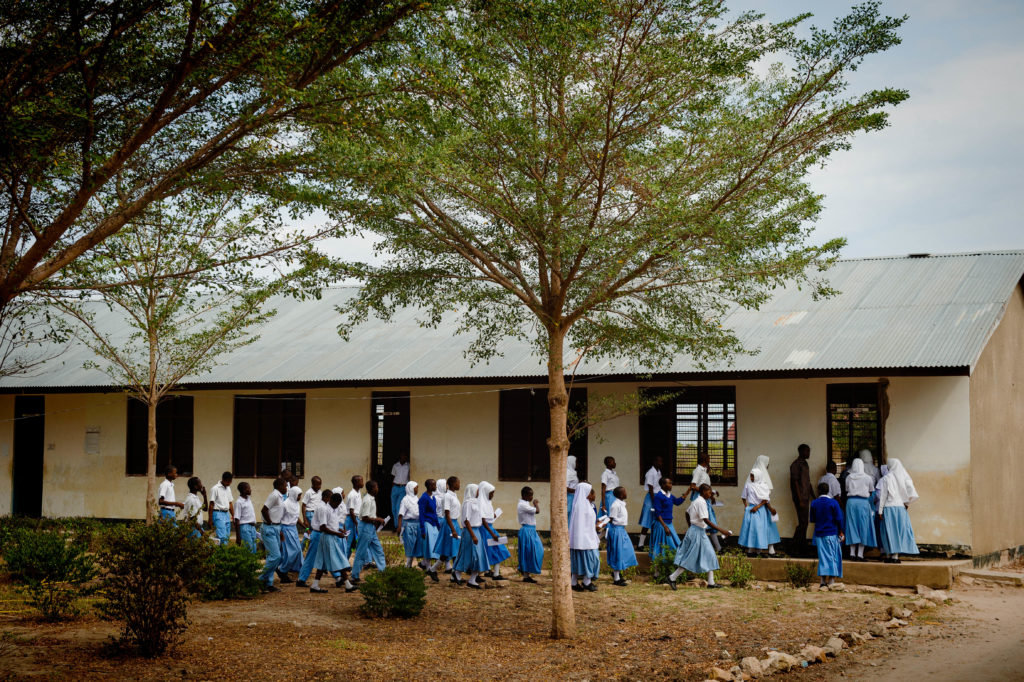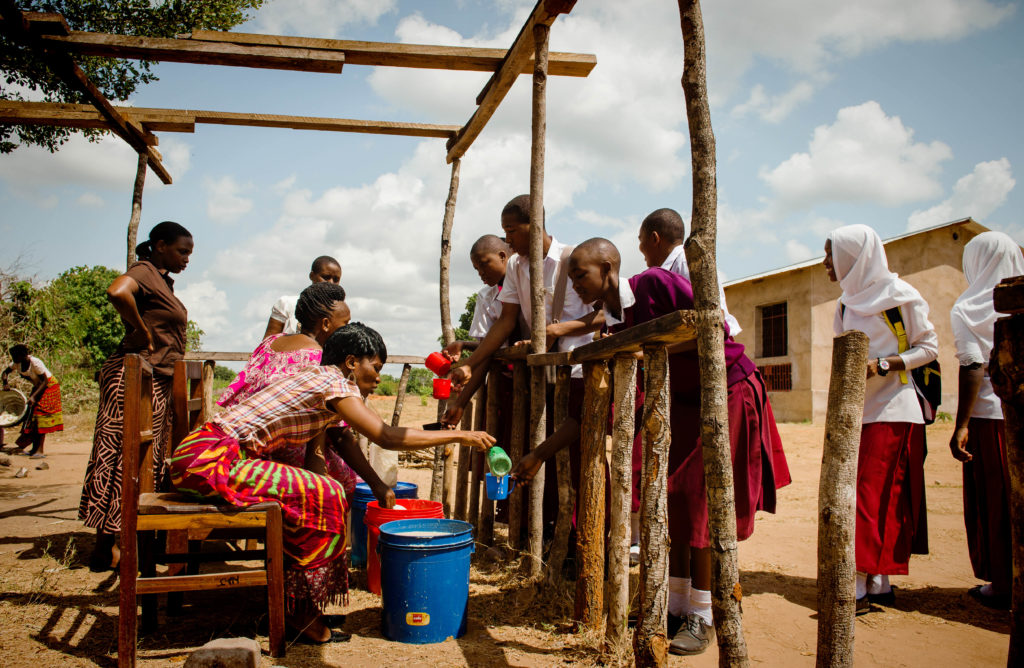By: Fiona Mavhinga, Founder, Camfed’s CAMA alumnae network
“I have seen girls suffer,” Mary told me. “And I knew I had to speak for them.”
Mary was born poor and grew up a rural girl, like me. But when she got the opportunity to attend secondary school with Camfed’s support, Mary excelled, and won a government scholarship to university to study education and become a teacher. It was her first time in the city, at an institution with thousands of more privileged students who had the benefit of an education in well-resourced urban schools. Mary’s lived experience though helped her truly understand the fault lines she saw, and fearlessly campaign to fix them.
 Secondary students in rural school. Camfed/ Eliza Powell
Secondary students in rural school. Camfed/ Eliza Powell
Mary learned that young women on college campuses and in big cities–in Africa and around the world–face similar problems to girls in her rural community. Those struggling with their own financial and personal circumstances, already fighting to stay in education, are at grave risk of sexual exploitation by those promising to bridge the financial gap. Mary, as Head Girl at her secondary school, had advocated against such relationships, and educated girls about the dangers of HIV/AIDS.
“Girls fear to report their problems,” Mary explained to me. “But we have the national Constitution to protect us. I thought, ‘Girls have rights, and I have a voice, and an ability. I should fight.’”
Our common past gives us empathy, strength, and boldness. Mary contested the election for student government, in spite of considerable challenges. Mary was on a government scholarship, had no money at all, and campaigning is expensive. You must hold events, provide t-shirts, buy banners and posters, provide transport, and lunches.
Some told her she wouldn’t succeed, but many students, including young men, started rallying around her and campaigning for her. They started making banners and posters for her, asked her what she wanted to put on them. “We’ll organise the events,” her supporters said. “You just come and talk. Women have equal rights in this institution.”
“A lot of people wanted me to represent them. I had to speak to more than 4,000 students,” Mary told me. “One of the questions they asked me was the issue of girls dropping out. I told them that there is no fear here. A love affair is a choice; you can’t force somebody. We will go together to fight this thing. Last year in March I was elected, and I was appointed Deputy Minister of Information & Communication in the Cabinet in April.”
Mary, a young woman from an impoverished rural community, managed to convince a whole university to vote for her. Without the financial backing, resources, or flamboyance that other students had, she succeeded.
 Mothers at a rural school providing meals for marginalized students. Camfed/ Eliza Powell
Mothers at a rural school providing meals for marginalized students. Camfed/ Eliza Powell
Mary took constructive action to solve a problem which could have created deeper fissures. She knew that lack of student accommodations made first-year students especially vulnerable to exploitation. As one of only four women in a student cabinet of 28, she led the lobbying effort.
“We lobbied the President of our country,” she told me. “We put forward our case, made sure we knew our legal rights, and brought statistics about girls who had left college early. The only thing we want here is a hostel, so that girls are not under pressure to sell themselves for accommodation and transport money. We convinced him with data and spoke our issues very clearly.”
The President came to the university in May 2016. By July, hostel construction had begun, and are now officially open, offering low-cost student accommodation. Mary and her cabinet have also lobbied for the lowering of university fees, and ensured that female students fully understand their rights.
“This suffering has no place at the university now,” she said. “We organised seminars with lawyers’ organisations and the Administration. They told the girls they have rights, they can choose what they want. Not be forced to fall in love, and that brought awareness.”
It pains me to think that somebody like Mary–leading a movement at her university which will change the prospects of young women for generations–would have dropped out of school, subject to early marriage, early pregnancy, and a short life of domestic toil.
Mary shares her success with other members of CAMA, Camfed’s alumnae network, which will grow to a movement of 100,000 members across sub-Saharan Africa this year. She was one of the 23 extraordinary young women from Malawi, Tanzania, Zambia, and Zimbabwe, elected leaders and ambassadors for CAMA, who joined our Regional Leadership Summit in Johannesburg this March.
We came together to explore how to further develop our network– a movement for girls’ education and women’s empowerment. We want to strengthen our shared values, and learn from and leverage the innovative ideas and ground-breaking achievements within the network.
Many of these young women will make history. Mary’s story illustrates why..
At our summit we talked about CAMA leadership transcending the network. Mary wasn’t talking for CAMA, but CAMA gave her the strength and the backing. She said when she was in a big meeting, she would just imagine that she was with CAMA, and everyone was agreeing with her.
“If someone could do all this for me, I need to do it for the other girls,” she told me. “I have nothing to fear. I need to speak up. Leadership comes with a lot of responsibilities. A leader can lead people to see light or darkness.”
Last week, I received an e-mail from the Skoll Foundation, whose support made our summit, and the scaling of our network, possible. Through its investment in CAMA, Skoll supports young women from marginalized rural communities across sub-Saharan Africa to step up for change, unleashing inspirational leaders for social good. The theme for next week’s Skoll World Forum in Oxford, Creating Common Ground, immediately made me think back to my meeting with Mary and CAMA’s other great leaders, living the words of Sally Osberg, the President and CEO of The Skoll Foundation.
“The work of democracy and justice is never finished,” she said. “Now is a moment to renew our common cause, to forge bold partnerships, to bridge all that divides. Now is the moment we must reunite with those left behind or spurned. Now is the moment to embrace our common humanity.”
Together, we forge ahead to build bridges across the greatest divides.
In keeping with Camfed’s child protection policy, we have omitted Mary’s surname, the name of her university, and other biographical details.
Fiona Mavhinga was one of the first girls supported by Camfed (the Campaign for Female Education) in Zimbabwe. She is a lawyer, and a founding member of Camfed’s CAMA alumnae network. Today she leads the development of the CAMA network, which is projected to grow to 130,000 by 2019, as a direct result of Camfed’s investment in girls’ education.